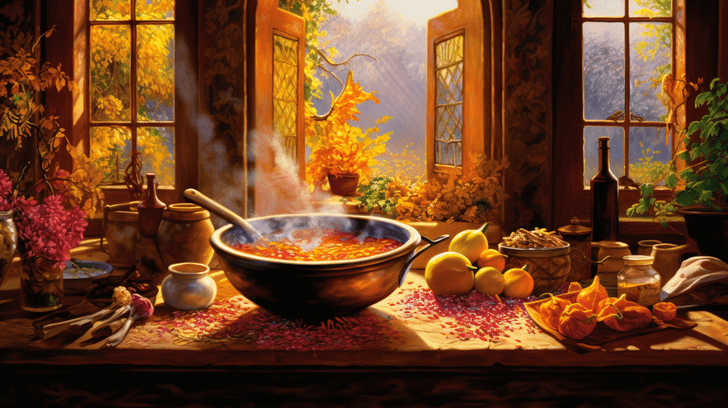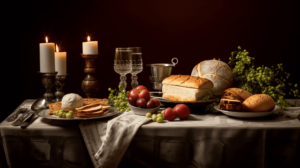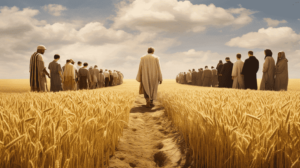Are you wondering what are the Jewish Sabbath cooking rules?
First, it is important to know that in the Bible the term “Jewish Sabbath” does not exist!
Did you know the Sabbath was made for everyone, and not only for the Jewish people? (Mark 2:27)
When God created the world after the six days, He instituted the Sabbath. He blessed it and sanctified it. And the only people alive back then were Adam and Eve, long before the Jewish nation came into existence. (see Genesis 2:2-3).
God told us to do no work on the Sabbath, therefore the cooking of food is considered work. (Exodus 20:8-11)
However, the Jewish Rabbis have taken it a step further and wrote an entire set of cooking laws in the Talmud.
Do we have to know these rules today as Christians? No, if we stick to the principle that says to do no work!
Yes, we must abstain from cooking because it involves work, however, we may heat our food to enjoy a warm meal!
Now, for the topic, let’s explore the “Jewish Sabbath cooking rules” made by the Jewish leaders.
“Jewish Sabbath” Cooking Rules
Have you ever wondered what happens when a sizzling pan meets the sacred rules of the Sabbath? We are going to uncover the meaning of bishul, the art of cooking on this holy day.
What Is Bishul?
To understand what bishul is, it’s important to know that it refers to the use of heat to alter the quality of an item on the Sabbath.
This practice has its historical origins in Jewish law and is applicable to all types of food and drink, regardless of whether they’re edible when raw or cold.
Bishul encompasses various cooking methods such as baking, boiling, frying, and roasting.
The restrictions of bishul differ for different types of food. For example, completely cooked dry foods like chicken or potato kugel can be reheated, while liquids that have been fully cooked may also be reheated.
However, the principle of ‘ain bishul achar bishul’ states that cooking doesn’t take effect after cooking. So, reheating foods is only allowed if they’ve been fully cooked.
Heat Sources for Bishul
You can use various heat sources for bishul, including a vessel heated directly on a flame or heat source known as a Kli Rishon, microwave ovens, and even the heat from the sun.
Using a Kli Rishon for bishul is a common practice. This involves placing the food in a pot or pan directly on the flame or heat source. The heat from the flame or source transfers to the vessel, causing the food inside to cook.
Another option is using a microwave oven. This heat source is also considered acceptable for bishul.
Finally, the heat from the sun can also be used for cooking on the Sabbath.
Whether you choose to use a Kli Rishon, a microwave, or the sun’s heat, it’s essential to follow the guidelines and restrictions of bishul.
Additionally, reheating fully cooked foods on the Sabbath is allowed, as long as the food has been completely cooked before the Sabbath begins.
Reheating Foods on the Sabbath
When reheating foods on the Sabbath, it’s important to ensure that they’ve been fully cooked beforehand.
This is because the permissibility of reheating on the Sabbath applies only to foods that have already undergone complete cooking.
The significance of fully cooking foods before reheating lies in the principle of ‘ain bishul achar bishul’, which states that cooking doesn’t take effect after cooking.
This means that once a food has been fully cooked, it’s no longer subject to the prohibition of bishul.
However, it’s crucial to note that the permissibility of using a microwave for reheating on the Sabbath is a subject of debate among Jewish authorities.
Some consider it acceptable, while others prohibit its use due to concerns about the intensity of the heat generated.
Preparing Hot Beverages on the Sabbath
For preparing hot beverages on the Sabbath, it’s important to consider the temperature of the water used. Pouring hot water straight from an urn can cause the cooking of tea leaves, which is prohibited on the Sabbath.
To lower the temperature, it’s recommended to use a kos sheini, a second vessel. Some authorities even suggest using a kos shelishi, a third vessel, because they believe that tea leaves easily cook even in a kos sheini.
Another option is to prepare concentrated tea extract before the Sabbath and then heat it with water from a kos sheini. This way, you can enjoy a hot cup of tea without violating any Sabbath laws.
Rabbinic Prohibitions and Fire Safety
To ensure the safety of your home and comply with Jewish law during the Sabbath, it’s important to be aware of the rabbinic prohibitions and guidelines regarding fire safety.
Preventing accidents and ensuring fire safety are crucial aspects of observing the Sabbath.
The prohibitions of shehiyah, hachzarah, and hatmanah aim to prevent potential fire hazards.
Shehiyah prohibits leaving uncooked food to cook on a lit stove or oven, while hachzarah forbids returning cooked food to a lit stove or oven.
Hatmanah, on the other hand, prohibits insulating food in certain ways to keep it warm.
It’s essential to follow these guidelines to prevent fires and maintain a safe Sabbath environment.
In the past, appliances for heating food and candles left burning during the Sabbath have caused fires, prompting the New York City Fire Department to distribute a pamphlet on fire safety for Jewish observances.
Fire Safety Precautions for Jewish Observances
Fire safety measures are crucial during Jewish observances to prevent kitchen accidents and ensure a safe environment.
Here are four important precautions to follow:
- Keep a close watch: Never leave the kitchen unattended while cooking. This is especially important during Sabbath observances when food is being prepared. Stay vigilant and focused on the cooking process to avoid any potential fire hazards.
- Maintain a clutter-free space: Clear the area around the stove or oven of any flammable materials, such as towels, curtains, or paper products. Make sure there’s enough space for ventilation and easy access to fire extinguishers or fire blankets.
- Test smoke alarms: Regularly check your smoke alarms to ensure they’re in proper working condition. Install smoke alarms near the kitchen area and on each level of your home for maximum safety.
- Have a fire safety plan: Prepare and discuss a fire safety plan with your family members. Teach everyone how to properly use a fire extinguisher and how to safely exit the house in case of a fire emergency.
Conclusion on Jewish Sabbath Cooking Rules
In conclusion, these are the Jewish practices for cooking on the Sabbath. It is important to know that in the Bible we do not find any of such details. Instead, they come from the Talmud, which is a Jewish writing.
Everyone is free to choose how they may want to practice their faith.
If you are a Christian though, the important thing to remember is to keep the principle, that is “to do no work on the Sabbath”.
If you need to reheat your meal, so that you and your family can enjoy a warm meal, there is nothing wrong with that.
However, to cook on the Sabbath is indeed not appropriate as it is clearly considered work.
We can do so in the other six days of the week.
References
https://en.wikipedia.org/wiki/Sabbath_food_preparation
My Letter To A Sunday Keeper – Sabbath Documentary

The Days of Noah – Powerful Documentary (Video Format)

Bible Studies – Written Format







